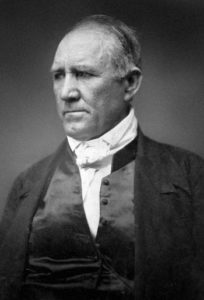
Sam Houston
*Sam Houston was born on this date in 1793. He was a white-American general and statesman.
Samuel Houston was born in Rockbridge County, Virginia, and inherited a slave plantation and mansion. He had many enslaved people throughout his life. His family migrated to Maryville, Tennessee, when Houston was a teenager.
Houston later ran away from home and spent about three years living with the Cherokee Native American tribe, becoming known as Raven. He served under General Andrew Jackson in the War of 1812 and, after the war, presided over the removal of Cherokees from Tennessee.
In 1823, Houston won the election to the United States House of Representatives and, in 1827, became governor of Tennessee. 1829, after divorcing his first wife, Houston resigned from office and moved to Arkansas Territory. Strong slavery laws were still in place under his leadership; he did not support the westward expansion of slavery.
His attitude toward slavery was pragmatism within his time and place context. Houston enslaved people but held a "centrist" position, believing both sides of the slavery debate were too extreme. Houston's most significant focus was not splitting up the Union. He thought states should decide for themselves on the issue of slavery. Houston settled in Texas in 1832 and led the Texan Army to victory at the Battle of San Jacinto. After the war, Houston won the 1836 Texas presidential election. Houston played a key role in annexing Texas and supported President James K. Polk's prosecution of the Mexican-American War.
He later voted against the Kansas–Nebraska Act, which led him to leave the Democratic Party. He was an unsuccessful candidate for the presidential nomination of the American Party in the 1856 presidential election and the Constitutional Union Party in the 1860 presidential election. In 1859, Houston won the election as the governor of Texas. In this role, he opposed secession and unsuccessfully sought to keep Texas out of the Confederate States of America.
He was forced out of office in 1861 and died on July 26, 1863. Houston's name has been honored in numerous ways, and he is the eponym of the city of Houston, the fourth most populous city in the United States.